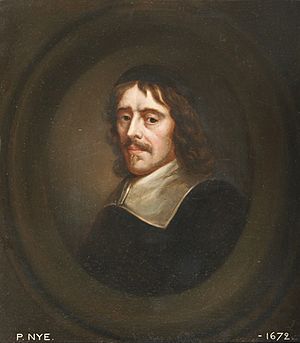Philip Nye facts for kids
Philip Nye (born around 1595, died 1672) was an important English religious leader. He was part of a group called the Independents, who believed churches should be free from government control. Philip Nye was also a member of the Westminster Assembly, a big meeting of religious experts. He was a main advisor to Oliver Cromwell, a powerful leader in England, helping him with religious matters and how the church should be run.
Contents
Life of Philip Nye
Philip Nye was born in Sussex, England, around 1595. His family was middle-class. In 1615, he started studying at the University of Oxford. He first went to Brasenose College and then to Magdalen Hall, Oxford. There, he learned from a Puritan teacher. He earned his first degree in 1619 and a master's degree in 1622.
Early Career and Exile
After finishing his studies, Philip Nye became a curate (a church assistant) at St Michael's Church in Cornhill, near London. However, he had problems with the church court, which was controlled by bishops. Because of this, he had to leave England. He lived in Holland from 1633 to 1640 as an exile, meaning he was forced to live away from his home country.
Working with Parliament
Later, Nye returned to England and became the leader of the church in Acton. The Parliament sent him on an important trip to speak with King Charles I, who was imprisoned at the time.
Nye was a key member of the Westminster Assembly. He was one of the "Five Dissenting Brethren," a group who disagreed with some of the main ideas being discussed. He was a leader of this group, working closely with Thomas Goodwin. Nye also had strong connections with the Parliament's army.
Important Contributions
Philip Nye helped write and promote the Solemn League and Covenant. This was an agreement between the English Parliament and Scotland. He and another clergyman, Stephen Marshall, traveled to Scotland to help make this agreement happen.
In 1644, Nye was part of a group that created the Directory for Public Worship. This book set out how church services should be held. Nye wrote a large part of it himself. In 1647, he was one of the preachers sent by Parliament to King Charles I on the Isle of Wight. Their goal was to help the King and find a peaceful solution for the country.
Later Life and Restoration
After the monarchy was brought back in 1660, Philip Nye was at first not included in the general pardon. This meant he could have faced serious punishment. However, he was later included in a special law called the Bill of Indemnity. This law protected him, but only if he promised not to hold any official government, military, or church jobs.
Even without official positions, Nye continued to work for independent churches. He was a respected religious scholar until he passed away in 1672. The poet Samuel Butler even wrote a poem about him.
Philip Nye's Views on Toleration
Philip Nye and Thomas Goodwin wrote a very important document called An Apologeticall Narration. They presented this to Parliament in 1644. In it, they asked for "toleration." This meant they wanted permission for Calvinist churches, like the Congregational churches they belonged to, to exist freely. They wanted these churches to be allowed even if they were not part of the main national church that was being planned, which was Presbyterian.
They argued that Congregational churches were more like the churches of early Christians. They also believed these churches could adapt better to changing times. This document helped them avoid long debates at the Westminster Assembly, where their group was much smaller. However, in later discussions in 1648, Nye agreed that the government should set some limits on religious freedom.
Philip Nye's Beliefs
Philip Nye was well-known for strongly supporting religious freedom and independence for churches. He did not want a church system where the government had too much control. However, he did like Presbyterianism for its strong beliefs based on the Bible.
Nye, along with Thomas Goodwin, also strongly argued for allowing Jews to return to England. They had Oliver Cromwell's support for this idea. However, there were many untrue and negative rumors about Jewish people at the time, which made it impossible for them to return then.
Nye was also against astrology and other superstitions.


